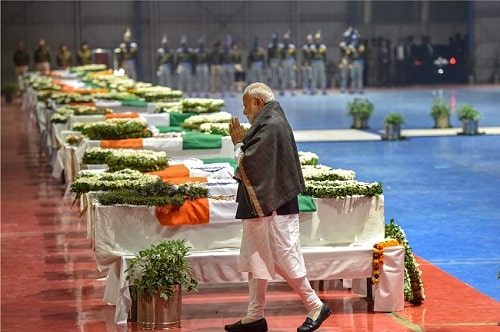
The airplane was ready on the runway. Coffins of the martyred CRPF Jawans (soldiers) were to be airlifted. Dheerendra Kumar Singh and his colleagues bent down to lift one of the coffins. Singh was surprised to see how easily he was able to lift the coffin, with almost zero effort. He did not feel the weight of the box. A moment later, his heart wrenched when he realized why the coffin was weightless.
Eyewitnesses recount that around 18 coffins were completely empty; they contained only the shreds of uniforms of martyred CRPF soldiers. Their bodies had just vaporized under the severe impact of 300 kilogram RDX blast.
And, empty coffins are the heaviest.
Rest of the coffins were more or less similar. What remained of the “bodies” of our martyred Jawans was nothing more than pieces and shreds of mangled, charred flesh. Soldiers who collected the ‘bodies’ of their martyred colleagues’ recount that it was impossible to collect most of the body parts simply because it had melted due to intense heat generated after the blast.

The most primal thing in a funeral is the body of deceased, which is cremated. Parents, wives, children and friends of the martyred Jawans could not even get to see their man for that one last time. Several families who did not get any remnants of their sons to carry out last rites, used only tiny shreds of uniforms during the cremation rituals. All that was left of the martyred Jawan was a sea of past memories and a giant void.
The 40 CRPF Jawans who were martyred in the Pulwama terrorist attack on February 14, hailed from different Indian states, were of different castes, clans and varnas. But they were Indians first. They lived and died for this nation.
Unfortunately, a specific section of people in this country often comes out with a guitar in their hands and compose songs like “This valley of death is not my country”. These “great men and women”, who often protest against the crackdown of terror outfits in the Kashmir Valley celebrate martyrdom of Indian soldiers. An Indian soldier in uniform remains the ultimate symbol of oppression in the eyes of these “great people”. These self-proclaimed ‘learned’ men and women often reach out to the terrorists to tell their side of the story but miserably fail to report about the pain suffered by a martyred Jawan’s family.
Till yesterday the martyrs’ might have been in pain seeing those few celebrating their deaths. Today, they might find solace that billions of Indians have stood up for them and want action against the traitors who have been celebrating the terror attacks and untimely martyrdom. It’s said that a new dawn comes up only with great sacrifice. The Indians who, hitherto, were lost in their self-centered lives have now started to show signs of life, they are seething with anger and demanding action against the seditious moles. It needed 40 lives to make us realize that we are intolerant to sedition. It needed 40 Jawans to make us stand against these groups of anti-nationals who sympathize with terrorists and demonize the men in uniforms.
A handful of these self-proclaimed intellectuals in this country question a Jawan’s sacrifice by comparing him with a paid security guard. These arm-chair, 5-star activists often say: “Jawans are security guards who get paid. They aren’t doing this out of greatness. Does an employer really feel pain for a security guard?” Okay yes, Jawans are security guards who get paid for their service. But their employers are 130 crore (1.3 billion) Indians who know what great service these “security guards” do. That’s why, when a commie believes that a compensation of Rs. 3,000 ($42) is too much for a security guard, the 130 crore (1.3 billion) Indians believe that even Rs. 10 lakh ($14,000) is too small an amount to compensate a Jawan. When a commie believes that we are paying back a “security guard” for his services, the nation believes that we are merely providing a maintenance for the soldier’s family, not the price of his precious life.
When a Jawan dies, the parents lose a son, children lose their father, wife loses her husband, siblings loses their brother and a friend loses his/her friend. When a Jawan dies, he leaves behind several broken hearts and a heroic legacy. All these things can never be measured by few pieces of paper with some numbers and an image of Gandhi—the rupee.
February 14th will forever be remembered in Indian history, till the day mankind exists.
For the world, 14th Feb will be the day of love.
For Indians, 14th Feb is the day of re-awakening.
Jai Hind.
